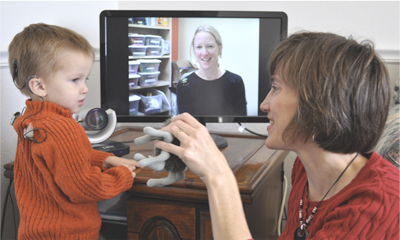The Massachusetts Department of Public Health (DPH) issued emergency guidance allowing early intervention agencies to provide services to children and families using phone/video communication. These services are referred to as “tele-health services”.
Due to the current state of emergency and unknown time frame that social distancing will be recommended, we highly encourage families to continue participating in early intervention using the tele-health model.
Families currently enrolled at a Thom early intervention program can expect to hear from their local EI program with information about tele-health services and the option to coordinate these services. Your EI program will work with you to determine the mode of communication that will work best for you. Our mission is to promote the healthy development of children and support families – we are thrilled to have this opportunity to safely provide continued services to you and your family!
We encourage participating in tele-health visits for the following reasons:
- Through tele-health, your child and family can continue valuable early intervention services without fear of introducing exposure to illness.
- With schools and many childcare settings closed for an unknown duration, many children are home and out of their typical routines/schedules. This can present its own set of challenges and as your early intervention provider, we can support you and your family through these challenges using the tele-health model.
- Tele-health aligns with our approach/philosophy to care, the Parents Interacting with Infants Model (PIWI), as it supports the use of the family coaching. These strategies have been shown to increase family engagement and empowerment as families learn to apply what they have learned to their daily routines.
- For the children and families we serve, the tele-health model will allow us to provide essential services during this turbulent time. In China and Hong Kong, we’ve already seen reports that children who no longer received services have experienced setbacks in their development. Their parents are struggling to deal with the very real after effects of unplanned interruption of important services, and this impact will be felt for months and years to come. (See article here)
- Research supports the benefits of tele-practice and as we currently do not have the option to complete in-person home visits, we believe that this is the best available option to continue our work together.


